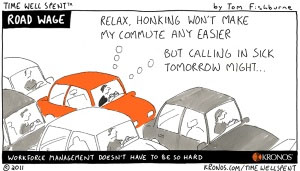Survey Shows Commute Can Cause Work Sickness
A new survey commissioned by The Workforce Institute at Kronos Incorporated and conducted by Harris Interactive reveals that more than 5,000,000 employed American adults have called into work sick because they couldn’t face their commute.
The survey examines how Americans commute to and from work; how their commutes impact their job satisfaction; and what they’d do if they didn’t have to spend so much time in the car.
[ Also Read: Need to Change 5 Old Rules at Workplace ]Findings of the survey:
- Four percent of adults who commute to work have called in sick to work because they couldn’t face their commute. These kinds of unscheduled absences cost organizations 8.7 percent of payroll each year as discussed in a recent survey conducted by Mercer and sponsored by Kronos.
- Few adults who commute to work – just six percent – are paid for the time they spend commuting.
- Round-trip commuting times vary, but most take less than hours with 45 percent of adults who commute to work spending less than 30 minutes; 32 percent spending 30-59 minutes; and 16 percent spending one to less than two hours.
- Everyone has their nightmare commuting story. Seven percent of adults who commute to work said their longest commute clocked in at five hours or more; 30 percent said it was more than two hours; and 31 percent said it was one to less than two hours.
- For many adults who commute to work – 48 percent – commuting has a significant impact on job satisfaction, and 32 percent said they took the commute into consideration when they chose their current job. Fifteen percent said they would change jobs to shorten their commute, and 11 percent feel their commute negatively impacts their work-life balance.
- Only 14 percent of adults who commute to work have the option of working from home, but among those who don’t have this option, 27 percent said they feel that given the necessary technology, they could do so effectively.
- Despite various initiatives to encourage more environmentally friendly commuting practices, the vast majority of adults who commute to work – 83 percent – still travel to work by car alone. Eleven percent use public transportation; 10 percent walk; and nine percent carpool.
- The radio is still king when it comes to commuting. Seventy-six percent of employed adult commuters listen to music on the radio or their own listening device. Twenty-two percent enjoy the quiet time; 18 percent talk on the phone or text; and 11 percent talk to their fellow passengers. Only seven percent of people read a book or magazine, while four percent do work.
- If they didn’t have to spend time commuting, the vast majority of adults who commute to work would be in bed. Fifty percent said they would sleep later; 42 percent said they would relax; 33 percent said they would spend time with family; and 28 percent said they would exercise.
“Managers should be mindful of the time their employees spend commuting as our survey shows it has a significant impact on job satisfaction. Where possible, putting policies in place to allow employees to travel during non-peak hours or work from home can increase employee satisfaction without a negative impact on the bottom line,” says Joyce Maroney, director of The Workforce Institute, Kronos.
[ Also Read: Thought Leaders Invited to Write for RMN News Site ]This “Road Wage” survey was conducted online within the U.S. between March 2 and 4, 2011 among 2,042 adults, of whom 1,077 commute to work, by Harris Interactive on behalf of Kronos, a global company providing workforce management solutions.
The survey findings were released Monday, April 25.





